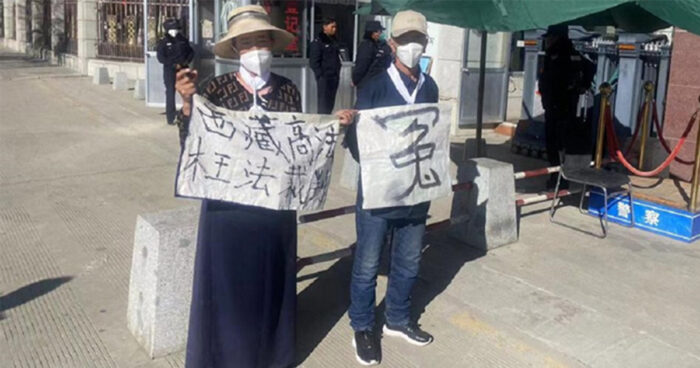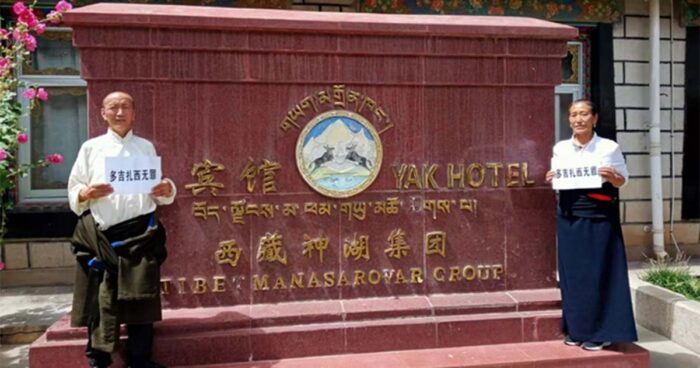For more than two years, a Tibetan woman named Gonpo Kyi has been seeking the release of her falsely accused brother, Dorjee Tashi. Last month a Chinese court ruled against her, putting justice for her younger brother even further out of reach.
On 24 September 2024, Lhasa City’s Chengguan District Court dismissed all five counts of Gonpo Kyi’s complaint against the district’s public security bureau. Gonpo Kyi’s lawsuit, filed in March 2024, primarily claimed that the ten-day detention she endured for peacefully advocating for her brother’s release violated her rights.
Gonpo Kyi, also known as Gontey (Ch: Gongde), has been actively seeking justice since June 2022 for her younger brother Dorjee (Duoji Zhaxi), who received a life sentence in 2010 after being framed as a “secessionist” in the wake of the Chinese government’s crackdown on mass Tibetan protests in spring 2008 and is imprisoned in the notorious Drapchi Prison. Before Gonpo Kyi began openly advocating for her brother’s retrial in June 2022, she and other family members had exhausted all remedies to seek justice by appealing to authorities in Beijing for over a decade. With no success through appeals, Gonpo Kyi began to demand justice publicly through sit-ins in front of the Tibet Autonomous Region Higher People’s Court in Lhasa.

Gonpo Kyi stood outside the Tibet Autonomous Region Higher People’s Court in Lhasa on 31 January 2023, holding a sign that read, “Tibet’s higher people’s court perverts the law.”
Gonpo’s complaint
ICT obtained a copy of the Chengguan District Court’s ruling, dated 24 September 2024. It says a case was filed on 25 March 2024, after Gonpo filed a complaint alleging unlawful actions by Chengguan District Public Security Bureau (PSB) by detaining her and violating her right to express herself. Accordingly, the court held a public hearing on 27 June 2024.
In her complaint, Gonpo claimed that the district PSB had broken the law by detaining her, that the monetary penalty on her should be withdrawn, and that a compensation of 4,368 Yuan (436.80 per day for ten days) should be given to her. Gonpo also claimed that her A4 sign and white cloth banner advocacy materials should be returned to her, and all her court expenses should be reimbursed by the district PSB.
Gonpo stated that it is her right to ask for a retrial of her brother’s case and that the A4 sign and white cloth banner—demanding Dorjee Tashi’s lawyers have access to documents and a retrial of Dorjee’s case—are her personal property and the PSB’s confiscation of the materials was illegal.
Unfair verdict
The court, in its 16-page-long verdict, ruled that the PSB’s detention of Gonpo Kyi was in accordance with Chinese law, the PSB’s defense that Gonpo’s activism (in the form of prostration, meditation, pasting flyers, lying down on the street) hindered the work of Tibet Autonomous Region Higher People’s Court is valid, the PSB’s ten-day detention of Gonpo Kyi is lawful, return of confiscated materials (A4 sign and white cloth banner) is not required, and Gonpo’s claim for monetary compensation is dismissed. Overall, the Chengguan District Court dismissed all of plaintiff Gonpo’s allegations and supported the defenses provided by the district public security bureau against her.
The comprehensive dismissal of all of Gonpo’s claims underscores the difficulties individuals face when challenging actions of state security organs in the Chinese legal system, particularly in Tibet. The court’s support for the public security bureau’s actions reveals a low tolerance for public displays of dissent or advocacy, even when conducted peacefully and a wide latitude given to the authorities in suppressing activism.
Gonpo Kyi’s advocacy
Since June 2022, Gonpo Kyi has been at the forefront of persistent efforts to seek justice for her brother. Her approach evolved from appeals to authorities in Beijing over a decade to more public forms of protest, including sit-ins in front of the Tibet Autonomous Region Higher People’s Court in Lhasa. Gonpo and her family members’ public advocacy for Dorjee Tashi reveals a growing frustration with the lack of progress through official channels and a willingness to risk personal consequences to draw attention to her brother’s case.
During her public advocacy for the past several years, the PSB subjected her to beatings, detentions, forcible removal from protest site and blocking her protest from public view, and threatened multiple times with severe consequences. Gonpo’s last activism was on 28 May 2024, during which she held an A4 sign demanding justice to Dorjee Tashi in front of the Higher People’s Court of the Tibet Autonomous Region in Lhasa. In another video clip from the same day, she shows bruises on her arm presumably from beatings by the security officers on site.
Gonpo in her most recent video statement after the court’s ruling is defiant of the authorities and pledges to persist in seeking justice for her younger brother.
Translation of Gonpo’s statement
“I have petitioned the court in Lhasa for a retrial of Dorjee Tashi’s case in accordance with the law of the country, but they have refused to do it. The police detained, dragged, and beat me multiple times. I’m currently in ill health due to these beatings. My right to ask for a retrial of my brother is powerless. Until the Lhasa Court addresses my appeal, I will persist.”

Gonpo Kyi and her husband, Choekyong, were seen holding a sign that read “Dorjee Tashi is not guilty” in front of Dorjee Tashi’s Yak Hotel in Lhasa in early 2023.
Background on Dorjee Tashi
Dorjee Tashi, a prominent former Tibetan businessman, is currently serving a life sentence in Lhasa’s Drapchi Prison, a facility notorious for its harsh conditions and alleged human rights violations.
The International Campaign for Tibet previously documented the case of Dorjee Tashi and the Chinese authorities use of torture on him during pretrial detention. Dorjee was arrested in the aftermath of widespread protests across Tibet in spring 2008 challenging Chinese rule. He was subsequently arrested on suspicion of providing clandestine support to Tibetan protesters and alleged connections with the Tibetan exile community. The investigation into Dorjee’s perceived political loyalties was unusually led directly by China’s Ministry of Public Security, which in Dorjee’s testimony, and subjected him to torture in an attempt to extract confessions about supposed political affiliations and foreign connections.
Although the initial political accusations against Dorjee were eventually dropped, he was later charged with “loan fraud.” The Lhasa Intermediate People’s Court sentenced him to life imprisonment and permanent deprivation of political rights in May 2010. In related cases, Dorjee’s family members also faced legal consequences. His elder brother, Dorjee Tseten, received a six-year prison sentence, while relatives Dhugkar Tsering and Tsultrim were sentenced to five and two years in prison, respectively.